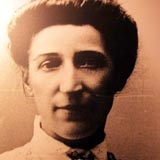PAUL SALVESON traces the life of early ILPer Hannah Mitchell and explains why her kind of politics is still an inspiration today.
When I was getting interested in working class history, back in the early 1970s, I was fascinated by a book called The Hard Way Up. It was written by a Northern working class woman called Hannah Mitchell. She was born in rural North Derbyshire and moved as a young girl to what must have seemed like the thriving metropolis of Bolton, where I was brought up. She became involved in the embryonic socialist movement and read Blatchford’s Clarion newspaper.
One of her earliest influences was Katherine St John Conway, herself a recent recruit to ‘the cause’ but from a very different class background. She heard her speak at a packed meeting in Bolton about the new gospel of socialism. She was fascinated by this articulate young woman and went away “with an inspiration which later sent me out to the street corners with the same message.”
Hannah Mitchell went on to become an accomplished speaker and activist for the fledgling Independent Labour Party. She got involved in the women’s suffrage movement which was particularly active in the Lancashire mill towns and campaigned across the North of England. Her socialism was of the ethical, humanistic kind which became so popular across the North where the ILP was strongest.
This kind of politics, in her words, “attracted a type of socialist who was not satisfied with the stark materialism of the Marxist school, desiring warmth and colour in human lives: not just bread, but bread and roses, too. Perhaps we were not quite sound on economics as our Marxian friends took care to remind us, but we realised the injustice and ugliness of the present system. We had enough imagination to visualise the greater possibility for beauty and culture in a more justly ordered state. If our conception of Socialism owed more to Morris than to Marx, we were none the less sincere, and many found their belief strengthened by the help and inspiration of the weekly meetings held in these Northern towns.” (The Hard Way Up, p 116).
This sums up Hannah’s politics, and the beliefs of thousands like her in the years before the First World War. But as well as having this romantic vision of socialism Hannah was a very practical activist. She became involved in local politics in Ashton-under-Lyne where she was elected onto the local ‘Board of Guardians’ responsible for poor relief.
A further move, to Manchester, led to her adoption as a council candidate in the face of some opposition from her male Labour colleagues. She was elected for the working class ward of Newton Heath, which she served with dedication for many years. In The Hard Way Up she mentions one of her proudest achievements being the public wash house which she struggled to get built to make working class women’s lives that bit easier. Her desire for ‘beauty in civic life’ blossomed in her work on public libraries, parks and gardens.
During the 1920s she became a regular correspondent for the ILP paper Labour’s Northern Voice. She wrote dialect sketches as ‘Daisy Nook’, poking fun at petty injustice and arguing the case for socialism in a light, accessible style which was quintessentially ‘Northern’.
Hannah’s life and work has been one of the main inspirations behind the formation of an organisation to promote the continuing relevance of ethical socialism and the need for a new debate on the importance of devolution for the North of England. A small group of socialists from across the North met on November 11th in the station pub at Sowerby Bridge, near to the Lancashire/Yorkshire border, and agreed to go form a Northern ‘think tank’ and to name it in honour of Hannah.
The Hannah Mitchell Foundation – “an ethical socialist campaign for regional government for the North” has as its main purpose to be “a forum for the development of a distinctive democratic socialism in the North, rooted in our ethical socialist traditions of mutuality, co-operation, community and internationalism. Its prime focus will be to develop the case for directly-elected regional government for the North of England – either as a whole or for the three regions which make up ‘the North’.
“Creating a devolved structure of governance for the North would be based on the key principles of democracy and subsidiarity, social equity and justice, and sustainable development in its social, environmental and economic senses. The foundation is named in memory of an outstanding Northern socialist, feminist and co-operator who was proud of her working class roots and had a cultural as well as political vision.”
Early days, but the foundation has already attracted lots of interest and could become the catalyst for a new approach to progressive regional politics.
Paul Salveson is convenor of the Hannah Mitchell Foundation. Donations are very welcome (cheques should be made to ‘The Hannah Mitchell Foundation’ and sent to HMF, 90a Radcliffe Road, Golcar, Huddersfield HD7 4EZ)
Membership details, including charges, will be published on our website shortly: www.hannahmitchell.org.uk.



30 October 2012
I remember Mrs Mitchell chasing me round her garden brandishing a carving knife! She was only joking me after I said she had a face like a walnut – she was quite wrinkled!